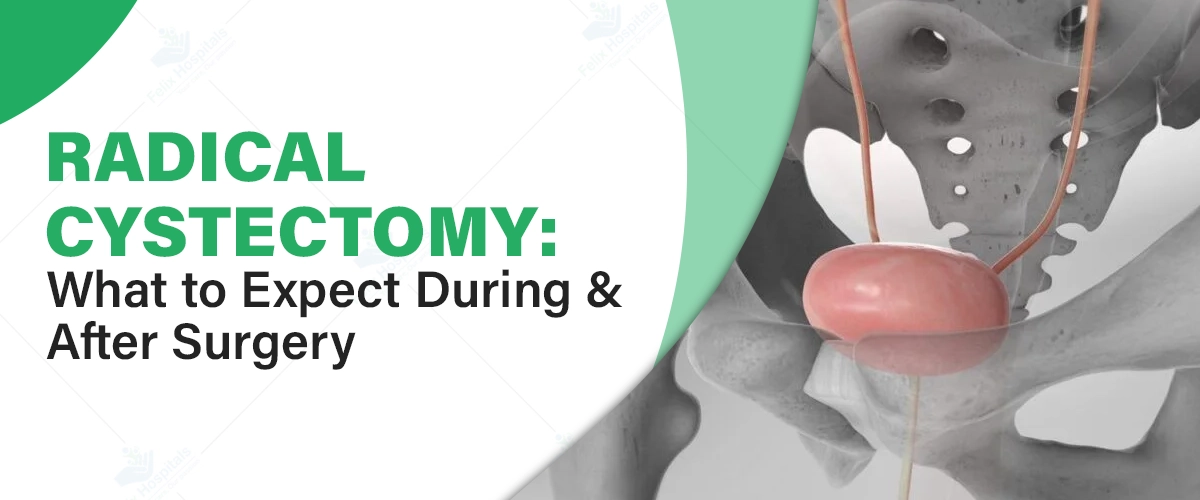
Subscribe to our

Radical cystectomy is a critical surgical procedure often performed for patients with bladder cancer or severe bladder dysfunction. It involves the removal of the bladder, and sometimes, nearby organs and lymph nodes, depending on the case. If you or a loved one are facing this procedure, understanding what to expect can help alleviate concerns and prepare for a smoother journey. At the best hospital for radical cystectomy, patients receive the best care, ensuring the best possible outcomes throughout the process. It's essential to be informed about the procedure, recovery, and potential lifestyle changes to navigate this significant step with confidence.
Have questions? Contact us at +91 9667064100 for a detailed discussion about the procedure, recovery, and costs involved.
Radical cystectomy is a surgery that entails the complete removal of the bladder. For men, this may also involve the prostate and seminal vesicles, while for women, it may include the uterus, ovaries, and a portion of the vagina. This procedure is primarily recommended for bladder cancer, chronic bladder dysfunction, or congenital abnormalities that impair bladder function.
The surgery is typically performed when the bladder is no longer able to function properly or when there’s a need to prevent the spread of cancer. It’s a life-changing procedure that requires careful consideration and a comprehensive treatment plan.
Before undergoing radical cystectomy, thorough medical evaluations are essential to ensure the procedure’s safety and success. The following steps are involved:
The surgery is performed under general anesthesia. The key steps of the procedure include:
Recovery at home requires time, patience, and support. While some individuals may resume light activities in a few weeks, full recovery can take several months. Here’s what to expect:
Like any major surgery, radical cystectomy comes with potential complications:
Life after radical cystectomy involves significant changes, but many individuals successfully adjust to their new reality. Here are a few things to keep in mind:
When considering radical cystectomy, it’s important to choose the right healthcare provider. Felix Hospitals boasts some of the best urologists specializing in radical cystectomy. For patients seeking expert care, Dr. Bhanwar Lal Barkesiya is a renowned urologist with years of experience in performing radical cystectomy surgeries. His expertise in personalized care ensures that each patient receives the highest standard of treatment, both before and after surgery. Regular screenings, ongoing communication, and early intervention are key to achieving the best outcomes.
Reach out to the best doctors today and take the first step toward your recovery. Click Here for Booking your consultation at Felix Hospitals.
Radical cystectomy is a significant procedure, but with the right preparation, medical support, and mindset, patients can recover successfully and lead fulfilling lives. Understanding the procedure, recovery process, and long-term care needs is crucial to managing expectations and improving outcomes. If you’re considering this surgery, be sure to consult experienced urologists at the best hospitals for radical cystectomy to ensure you receive the best care.
To better understand the procedure and its cost in India, schedule a consultation today with experienced surgeons. Radical cystectomy costs in India may vary depending on the hospital and location, but at specialized medical facilities, you can rest assured that the care provided will align with global standards for optimal recovery.
Q- What are the different urinary diversion options after radical cystectomy, and how do I decide the best one for me?
Ans- The choice depends on various factors, including your health condition, lifestyle, and surgeon’s recommendation. Options like ileal conduit, continent reservoir, and orthotopic neobladder each have unique benefits and care requirements.
Q- What kind of pain management is provided after radical cystectomy?
Ans- Post-surgery, patients are provided with a combination of medications and techniques, including IV pain relief and oral medications, to ensure comfort during recovery.
Q- How soon after surgery can I return to work or normal activities?
Ans- The timeline for resuming daily activities depends on the nature of your job and the type of urinary diversion performed. Most patients can engage in light activities within 4–6 weeks.
Q- What are the dietary changes needed after radical cystectomy?
Ans- You’ll need a fiber-rich diet to prevent constipation and may be advised to avoid foods that can irritate your digestive system. Your doctor will provide specific guidelines tailored to your recovery.
Q- How do I care for a stoma if I have an ileal conduit?
Ans- Stoma care involves cleaning, applying a fresh pouch, and monitoring for signs of irritation or infection. Felix Hospitals provides stoma education to help patients manage this effectively.
Q- What are the risks of long-term complications like hernias or recurring infections?
Ans- Long-term complications are rare but can occur. Regular follow-ups and adopting a healthy lifestyle can help prevent or address these issues promptly.
Q- Can bladder cancer recur after a radical cystectomy?
Ans- Though radical cystectomy is a definitive treatment, there is a small chance of recurrence. Regular screenings and follow-ups are crucial for early detection and intervention.
Q- What support systems are available for patients recovering from radical cystectomy?
Ans- Felix Hospitals offers access to support groups, counseling services, and patient education programs to help patients adjust emotionally and physically after surgery.